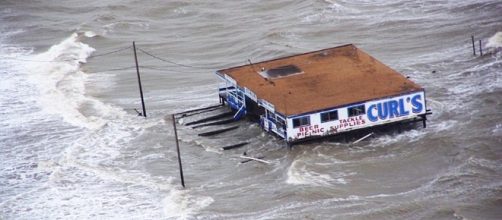Just when you think you have it bad, other people have it a million times worse. Your main concern today may be hoping to escape midday traffic on your way to a meeting. For thousands of Americans, they’re hoping for some clean water, food, clothes, and finding their home that was totally submerged by floodwaters. When you think about it, you’re doing just fine.
Funeral homes are running out of space
The August 2017 hurricane season brought great tragedy to the United States in the form of Hurricane Harvey. Nearly 42,000 people are now being housed at shelters, and those daring to return to partially submerged homes are being warned to look out for snakes and other wildlife that may have crept in.
But as bad as that may sound, there are now bigger problems at hand. In yet another tragic turn of events stemming from Hurricane Harvey, Funeral Homes are now lamenting their inability to collect corpses.
The devastating natural disaster hit the US state of Texas nearly a week ago, dumping approximately twenty trillion gallons of water in the Houston area. More than one million people have since been forced to evacuate their homes, with fears that there may still be persons trapped inside theirs.
Authorities have said the death count figure is expected to grow as floodwaters subside. A series of explosions yesterday at a flood damaged chemical plant outside Houston also leaves uncertainty as to whether anyone was injured or killed.
Today, funeral homes are on alert to the collection of bodies, but flooded roadways and other courses are preventing them from completing a much-needed task. As if having corpses decaying in homes, vehicles and other areas weren’t disturbing enough, another problem will soon arise.
The Houston morgue is running out of space to hold the bodies coming in. A spokesperson at the Harris County Institute of Forensic Sciences confirms today that capacity at the morgue is 200 but 175 spaces have already been filled. This has led them to request a refrigerated tractor-trailer to handle any overflow. Whether they’ll get it or not remains to be seen, but the situation continues to look grim.
Rescue work is continuing
Rescue, also with search and recovery efforts are continuing in America’s fourth largest state, but there’s no estimation as to how many other bodies will be found that are not flood related deaths. Rotting, swollen bodies left uncollected are at risk of bursting in humid conditions and spreading untold disease and other hazards to human health. The situation is eerily reminiscent of Hurricane Katrina that swept through New Orleans, Louisiana in 2005. Funeral homes are today, just some of the businesses which have been forced to close, along with convenience stores, gas stations, groceries, and churches. Hurricane Harvey now joins the ranks of the deadliest and costliest storms in US history.


